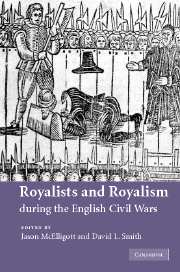Book contents
- Frontmatter
- Contents
- Notes on contributors
- Preface
- Abbreviations
- 1 Introduction: rethinking royalists and royalism
- 2 A lesson in loyalty: Charles I and the Short Parliament
- 3 The Court and the emergence of a royalist party
- 4 Varieties of royalism
- 5 Royalist reputations: the Cavalier ideal and the reality
- 6 Counsel and cabal in the king's party, 1642–1646
- 7 ‘I doe desire to be rightly vnderstood’: rhetorical strategies in the letters of Charles I
- 8 Royalists and the New Model Army in 1647: circumstance, principle and compromise
- 9 The royalist origins of the separation of powers
- 10 ‘A No-King, or a New’. Royalists and the succession, 1648–1649
- 11 The royalism of Andrew Marvell
- Subject Index
- Author Index
6 - Counsel and cabal in the king's party, 1642–1646
Published online by Cambridge University Press: 19 July 2009
- Frontmatter
- Contents
- Notes on contributors
- Preface
- Abbreviations
- 1 Introduction: rethinking royalists and royalism
- 2 A lesson in loyalty: Charles I and the Short Parliament
- 3 The Court and the emergence of a royalist party
- 4 Varieties of royalism
- 5 Royalist reputations: the Cavalier ideal and the reality
- 6 Counsel and cabal in the king's party, 1642–1646
- 7 ‘I doe desire to be rightly vnderstood’: rhetorical strategies in the letters of Charles I
- 8 Royalists and the New Model Army in 1647: circumstance, principle and compromise
- 9 The royalist origins of the separation of powers
- 10 ‘A No-King, or a New’. Royalists and the succession, 1648–1649
- 11 The royalism of Andrew Marvell
- Subject Index
- Author Index
Summary
Late in 1643, with the royalist war effort faltering, Charles's bedchamber man Endymion Porter identified two evils that had ‘much slubbered the Kings affaiers’. The first was ‘the manie mistakes wch have lately hapned in his Mats councells’; the second was the fractious state of royalist politics – ‘wee have such a seminarie of faction both in the courte and Armie, as God must worke miracles if the King bee well served’. Porter's belief that the ills afflicting the king's cause were essentially political in nature fits well with the findings of the latest military history of the English Civil War. If the king did not lose the war through lack of resources, as now seems clear, then the answer would seem to lie with the problems of counsel and factionalism that Porter highlighted. Unfortunately, these are precisely the aspects of the king's party that have most successfully defied analysis. For all the recent work on the Caroline Court, Ian Roy's observation, forty years ago, that the whereabouts of power and influence at Oxford (the king's wartime headquarters) remains largely obscure is still true today.
The dynamics of counsel – how and from whom the king took advice – and the formation of Court factions were of course intimately linked. Courtiers with easy access to the king, and therefore to the royal ear, were likely to attract supporters eager for preferment or to advance particular policies.
- Type
- Chapter
- Information
- Royalists and Royalism during the English Civil Wars , pp. 112 - 135Publisher: Cambridge University PressPrint publication year: 2007
- 4
- Cited by



